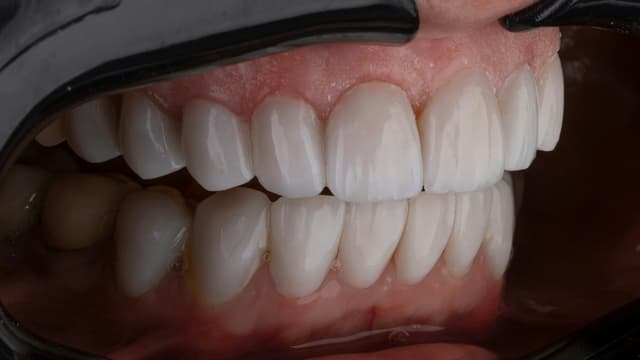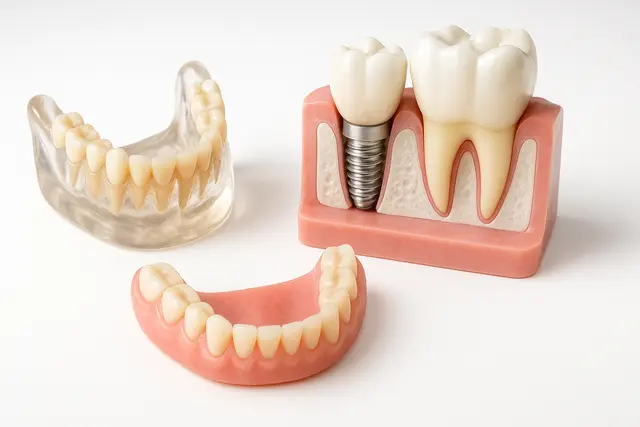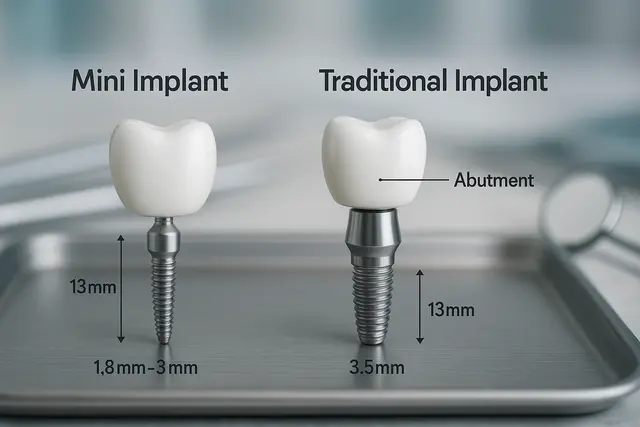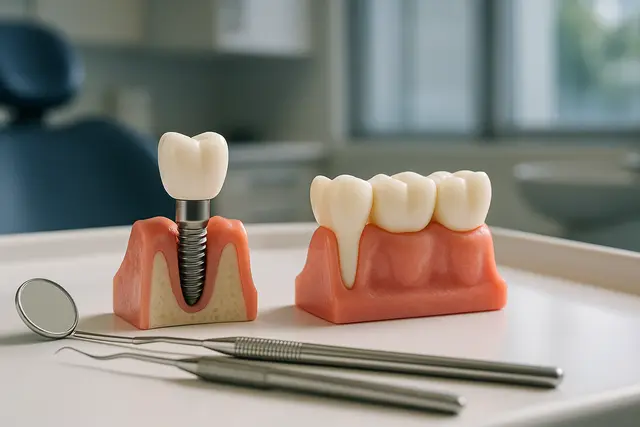Prosthodontics
5 min read
Mar 28, 2025
Can You Get Dental Implants with Low Bone Density? Options and Alternatives
Dental implants rely on healthy jawbone for support. When bone density is low, it can limit this option. However, advances in implant dentistry give patients with weak or thin bone several possible solutions.

Losing teeth is tough enough, but hearing that you might not have enough bone for dental implants? That can feel like an extra gut punch. If you're wondering whether you can still get dental implants with low bone density, the good news is: there are options. Real ones. And they’re getting better every year.
Low jawbone density, bone loss, osteoporosis, these aren't rare issues. They’re actually really common. And modern implant dentistry has stepped up to meet the challenge. You’re not stuck with a future of loose dentures or giving up on your smile. Let’s walk through what’s possible (because honestly, there’s a lot more hope than fear in this story).
Why Bone Loss Happens (and Why It Matters)
When you lose a tooth, the jawbone underneath doesn’t just sit there politely waiting. Without the pressure and stimulation that chewing provides, the bone begins to shrink away. It's called bone loss, and it can start within months after tooth loss.
And when it comes to placing a dental implant, you need healthy bone to anchor the implant screw. Not enough bone? It can affect dental implants by making them less stable or more likely to fail over time. That’s why your dentist pays extra close attention to your bone density before moving forward with any implant procedure.
Osteoporosis and Your Smile Goals
Now, if you’re dealing with osteoporosis, you might wonder if dental implants are off the table completely. Not necessarily. Patients with osteoporosis can still get dental implants. It just takes a bit more planning.
Osteoporosis weakens bones by reducing bone mass and strength, and yes, that can include your jawbone. But with the right implant option and smart treatment planning, many patients with osteoporosis still enjoy successful outcomes. It’s not about having perfect bones; it’s about working smart with the bone you’ve got.
Your dentist will likely check your bone density in the jaw to figure out the best route forward. And if you’re on osteoporosis medication, they’ll make sure the timing and healing line up safely with your dental needs.
How Bone Grafts Give You a Second Chance
Here’s where things get exciting: even if you don’t have enough bone to support regular implants right now, you might after a bone graft.
A bone graft basically acts like scaffolding for your body to grow new bone around. It can come from your own body, donated human tissue, or artificial bone materials, all designed to build up the area where the jawbone is thin.
Bone grafting procedures can fix small trouble spots or rebuild major sections, depending on how much jawbone loss you’re dealing with. After healing, your new bone gives the dentist a sturdy base to place dental implants. No shortcuts, no unstable implants, just careful rebuilding so your smile stands strong.
What If Bone Loss Is Severe?
Now, for people with major, significant bone loss, like after years of missing teeth or severe periodontal disease, there’s a tougher road ahead, but not a dead end.
If your jawbone has shrunk too much, or if bone grafts aren’t an ideal fit, dentists can turn to special techniques like zygomatic implants. These longer implants are anchored into the zygomatic bone (the good, strong cheekbone) rather than the thin upper jawbone.
That means even when traditional dental implants aren’t an option, you can still replace missing teeth without needing massive grafts or risky surgeries. Pretty amazing, right?
Zygomatic Implants: The Unsung Heroes
When you hear "zygomatic," think tough and reliable. The zygomatic bone doesn’t thin out the way jawbones do after tooth loss, making it the perfect anchor point for implants when the upper jawbone isn’t playing nice.
A zygomatic implant may sound fancy (okay, it kind of is), but for patients with severe bone loss, it can mean the difference between permanent teeth and living with uncomfortable dentures. It skips a lot of the healing time you’d need after major bone grafts, too.
So if you’ve been told your bone loss is "too advanced" for traditional implants, don’t give up until you’ve talked about zygomatic options.
Can You Still Get Dental Implants with Low Bone Density?
In most cases? Yes, you can still get dental implants even with low jawbone density.
Low bone density, low bone mass, or even a lack of bone altogether doesn’t automatically mean implants are out. It just means your dental team will need to come up with a personalized plan to make sure the implants stay solid over the long haul.
Bone grafts, zygomatic implants, mini-implants, and even short implants are all part of the toolkit for complex dental implant cases. You’re not stuck, you just need someone who knows how to use the right tools.
Avoiding Dental Implant Failure
Here’s the thing: rushing an implant into low bone is asking for trouble. Insufficient bone density, if ignored, can lead to dental implant failure. No one wants to go through implant surgery twice, so it’s worth doing it right the first time.
A skilled dentist will always look for enough bone density to support the implant, not just "hope for the best." Whether that means building new bone through grafts or using alternative implants, the goal is to make sure the success of dental implants is strong and long-lasting.
Skipping steps to place dental implants in low bone areas without a plan often leads to bigger problems later, like bone loss around dental implants, loosened implants, or infections.
How Your Gum Health Affects the Story
Quick reminder: healthy gums matter too. If you have periodontal disease (or have had it in the past), it can speed up jawbone loss around implants. Gum infections can lead to dental implant problems faster than you can say “floss more.”
Before getting dental implants, your dentist will check for signs of gum disease and make sure everything is stable. Because protecting the bone around the implant is just as important as placing the implant itself.
Timing and Treatment Planning
If you’re dealing with missing teeth right now, the best advice? Don’t wait. The longer the jawbone goes without a tooth, the more it shrinks. Acting sooner gives you more options, fewer grafts, fewer complications, better dental implant success.
Even if some bone loss has already happened, early treatment often means simpler solutions. And if you’re already facing significant or severe bone loss, choosing the right treatment option now can still deliver amazing results.
The Bottom Line: You're Not Out of Options
Yes, you can still get dental implants with low bone density. You just need the right plan, the right dentist, and sometimes a little extra help from a bone graft or a zygomatic implant.
You don’t have to settle for feeling self-conscious about missing teeth or worry that osteoporosis or low jawbone density means you're stuck. Modern implant dentistry has opened doors that used to be slammed shut.
Every smile deserves a second chance, and there are more ways than ever to make sure yours is strong, confident, and built to last.
Can You Get Dental Implants With Low Bone Density?
Yes, many patients with low bone density can still receive dental implants. Dentists now have advanced options like bone grafts, short implants, and zygomatic implants to rebuild or work around weakened jawbone. A personalized treatment plan can make implants possible even in complex cases.
What Is a Bone Graft and Why Might I Need One?
A bone graft rebuilds areas of your jaw that have lost bone due to missing teeth or gum disease. It creates a strong foundation for implants by encouraging your body to grow new bone in the right spot. Grafts are common and often essential for implant stability and long-term success.
Are There Alternatives to Bone Grafting for Severe Bone Loss?
Yes, alternatives like zygomatic implants can be used when bone grafting isn’t ideal. These longer implants anchor into the cheekbone, bypassing thin or damaged upper jawbone. They offer a solid option for patients with significant bone loss who still want fixed, implant-supported teeth.
Does Osteoporosis Prevent You From Getting Dental Implants?
Not necessarily. While osteoporosis affects bone strength, many patients with this condition still qualify for implants. Dentists carefully evaluate bone health and may adjust treatment to ensure safety and healing. With the right planning, dental implants can succeed even in osteoporotic patients.
Read Next
Related Posts

Prosthodontics
How to Choose Between Dentures and Implants for Tooth Replacement
Losing teeth can be a tough experience, physically, emotionally, and socially. Fortunately, modern dentistry offers reliable solutions to restore both function and confidence. Among the most popular options are dentures and dental implants, each with its own advantages depending on your needs, health, and lifestyle.
6 min read
Oct 21, 2025

Prosthodontics
Mini Implants vs. Traditional Implants: How They Work and When to Choose Each
Missing teeth can impact more than just your appearance, they can affect your confidence, oral health, and ability to enjoy everyday activities like eating and speaking. Fortunately, dental implants offer a reliable solution. But when it comes to choosing between mini implants and traditional implants, the differences can be surprisingly significant.
5 min read
Oct 21, 2025

Prosthodontics
Single Tooth Implant vs. Bridge: Pros and Cons
Missing a tooth can feel overwhelming, but you're not alone. Whether it’s from an injury, decay, or an unexpected mishap, choosing the right way to replace it is a big decision. Two of the most common options are dental implants and bridges, each with its own benefits and trade-offs. Understanding the differences can help you make a confident, informed choice for your smile and long-term oral health.
5 min read
Oct 21, 2025
Don’t have time to research every dentist around you?
See why 30k+ patients trusted us